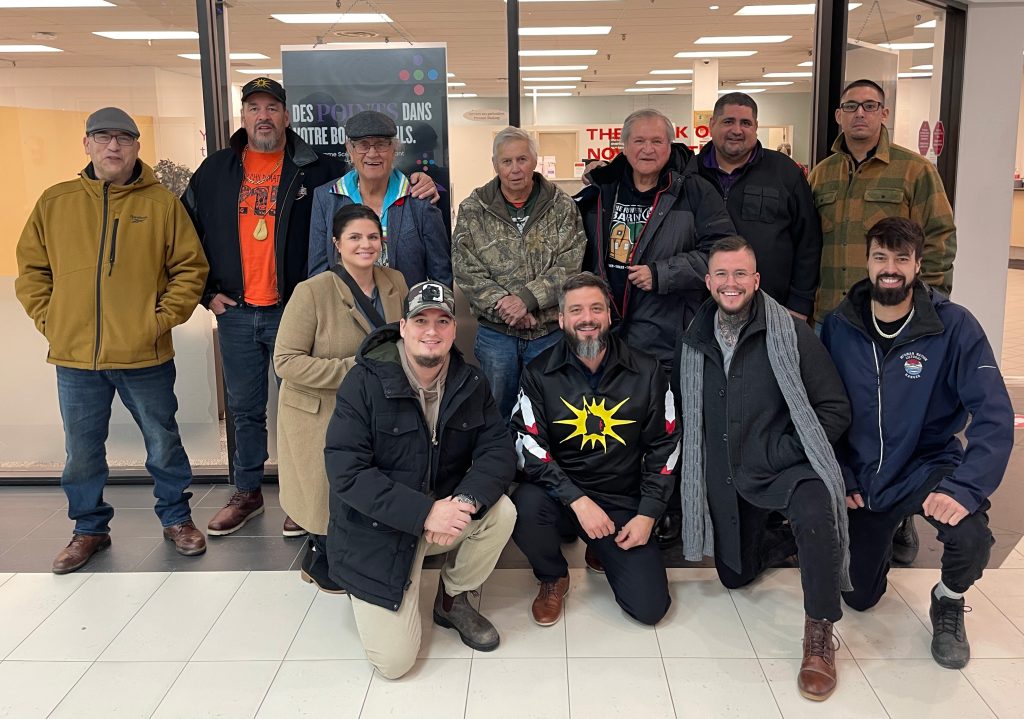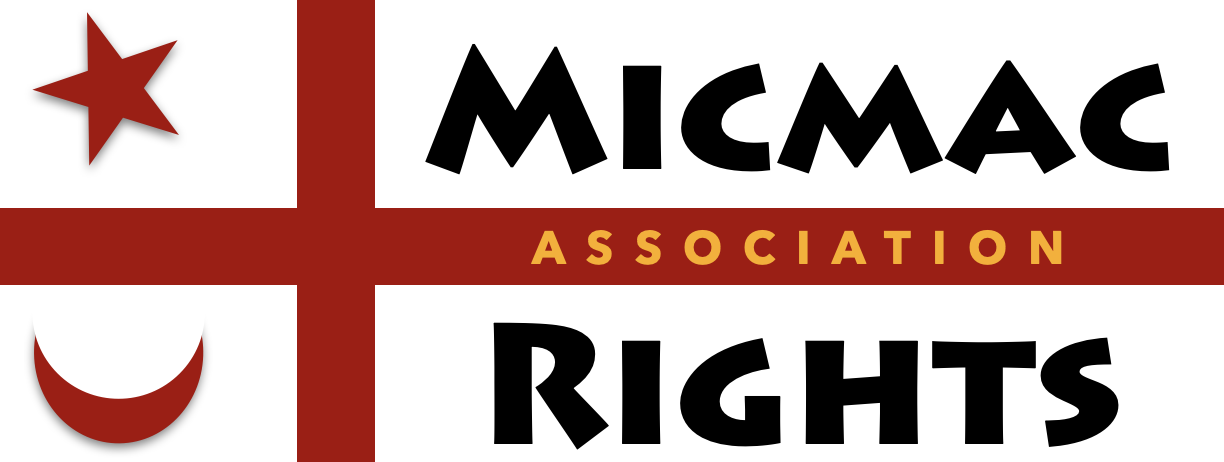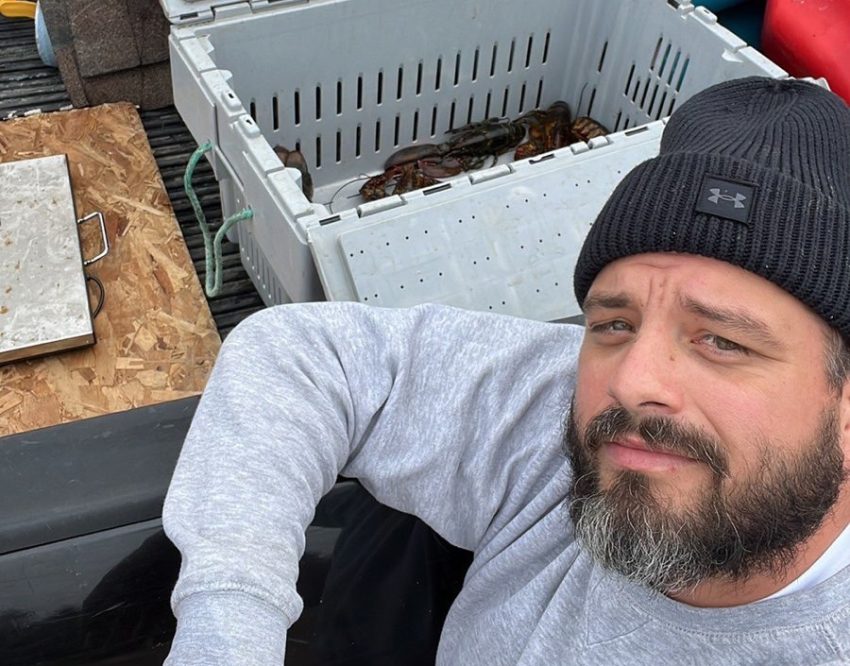
Opening statement by Cody Caplin
My name is Cody Robert Ralph Brimsacle Caplin. I am a Mi’kmaw man, born and raised in the community of Ugpi’ganjig (Eel River Bar). My ancestors made nation-to-nation treaties with the British Crown, the French Crown, the United States of America, and with other Indigenous nations like the Mohawk Nation. We warred and we made peace. In 1725, my nation began what became our “Covenant Chain” treaty relationship with the British Crown, and this treaty was repeatedly renewed in different locations across Mi’kma’ki.
Jean Baptiste Cope, the Mi’kmaq Nation Grand Chief and some 90 other individuals made the Treaty of 1752 with the British Crown which outlined our rights to hunt, fish, and trade and renewed earlier agreements. Addressing a treaty gathering which renewed the 1752 treaty in 1761 in Halifax, Nova Scotia, Governor Jonathan Belcher promised my ancestors that the covenant of peace between the British Crown and the Mi’kmaq would place us “in the wide and fruitful field of English liberty.” He added, “the laws will be like a great hedge about your rights and properties. If any break this hedge to hurt or injure you, the heavy weight of the laws will fall upon them and punish their disobedience.”
Sadly, as is evident by the charges laid against me, the honour and the promises made by representatives of the British Crown are not been upheld.
The Covenant Chain of Mi’kmaq peace and friendship treaties with the British Crown (1725-1779) are very clear about recognizing the Mi’kmaq Aboriginal right to hunt and fish for personal subsistence. This was an obvious and basic right as hunting and fishing for our subsistence has been how our people have always survived, since long before any Europeans landed on our shores. Our right to feed ourselves is so obvious and basic that it was not always mentioned in the treaties, although we do see it specifically referred to in the treaty of 1752, where Clause 4 states that “It is agreed that the said Tribe of Indians shall not be hindered from, but have free liberty of Hunting & Fishing as usual.”
The last treaty in Covenant Chain of peace and friendship treaties was the “Treaty entered into with the Indians of Nova Scotia from Cape Tormentine to the Bay De Chaleurs, September 22nd, 1779” which was made with my ancestors from this region. This treaty, which was signed in the context of British fears that the American revolution would spread into Mi’kmaq territories, stated that “the said Indians and their Constituents, shall remain in the Districts before mentioned, quiet and free from any molestation of any of His Majesty’s Troops, or other his good Subjects in their hunting and fishing.”
It is important to remember that these treaties are peace and friendship treaties, and do not contain land sales or the surrender of Mi’kmaq sovereignty. They are what my elders describe as the extension of kinship relations by the Mi’kmaq to the British Crown, as a means of creating peace and friendship to resolve armed conflicts instigated by friction between rival colonial powers operating on Mi’kmaq lands and waters.
The Mi’kmaq people never surrendered our right to our lands and waters or the right to sustain ourselves from them. Our most obvious inherent Aboriginal right is to be able to feed ourselves upon the land our creator put us on. The recognition of this Aboriginal right to hunt and fish is not only found throughout the Mi’kmaq treaties with the Crown, but is a standard article of most other treaties made between the British Crown and Indigenous nations. Within our worldview this is in fact a spiritual question based in the mutual inter-relationship between Mi’kmaq peoples and the plant and animal beings that we share our territory with. In other words, “I am the lobster and the lobster is me.”
It is a great insult to the sacred nature of the treaty relationship between our peoples that the Crown is pursuing these charges against me, and a violation of the principle of the honour of the Crown.
Indian Act Racism
My great-grand parents were rounded up and put on reserves because of the racist Indian Act which violated our peace and friendship treaties. Our people were given numbers and controlled with race based legislation that didn’t even consider us “persons” and that made it illegal for lawyers to represent our interests. The government’s policy of “centralization” which saw the removal of Mi’kmaq people from our unceded lands and our concentration on reserves controlled by Indian Act federal government representatives was done in order to remove us from our lands and destroy our ability to sustain ourselves. Our children were taken away and sent to residential school so as to “kill the Indian and save the child.”
This is a shameful chapter in Canadian history, and all the more so given the fact that in 2023 it is still not over, and our people continue to be persecuted for exercising our rights. As of today, nearly a quarter century on from the Marshall decision, Kukukwes News reports that over 54 Mi’kmaq fishermen in Nova Scotia alone are facing fishing related charges for exercising their Aboriginal and treaty rights.
I come from a family lineage directly connected to our lands and to our treaty making relationship with the British Crown. The Peace and Friendship treaty of June 25th, 1761 was signed on the banks of the Miramichi river in my people’s territory between the representatives of the Sovereign King George III and our own representative of Mi’kmaw sovereignty, our “Ikan-putu-wit” who signed the treaty using our totem/clan symbol. My Mi’kmaw grandmother Marion Simonson was born along this same river on April 23, 1913 to parents who were trappers, fishers, hunters and gatherers. They lived deep in the forest in the winter, and took to the rivers and the sea coast in the spring to fish for food and to trade.
My grandmother Marion lived to the age of 94. I recall that when I was about 12 years old, my grandmother told me about how on the railroad line going from Montreal to Halifax, she would enter the train and speak to the conductor about our “treaty” rights to travel, and that the train would take her where she wanted to go without charge on the basis of these rights. My grandmother was well aware of her Aboriginal and treaty rights and she was a rich source of oral history about our peoples’ customs and conventions. She taught me that we have the right to hunt and fish on our lands to sustain ourselves, without needing any special permission from the Crown or anyone else.
Fishing for subsistence and facing DFO Racism
My brother Kyle and I began to fish for lobster and salmon in our traditional waters about 10 years ago. We needed food to feed our family, and were trying to find a way to put some money in our pockets too. In 2015 we acquired a 20 foot salmon skiff. Sadly, as soon as we began exercising our Aboriginal and treaty rights – rights which have been clearly upheld by Canada’s own Supreme Court in the 1999 Marshall decision and which are explicitly protected by Sections 25 and 35 of the Canadian Constitution – we began to be targeted by officers of the Department of Fisheries and Oceans (DFO) who seemed determined to stop us from exercising our rights.
[the following paragraph was objected to by Crown Prosecutor Mark Stares and was excluded by Justice LeBlanc]
According to the DFO officers, we were the bad guys and they were the “good cops.” They were always harassing us, and stealing our gear and making racist comments to us. I remember one time that DFO officer Eric Friolet said to me when I brought up the Marshall decision to him to justify my rights, “that judge must have been drunk the day he made that decision.” These officers showed no respect for any of the laws or court decisions made by Canada which uphold and protect our Aboriginal and treaty rights. When we went out fishing, they would come and take our traps the same day. This is hardly upholding the honour of the Crown, or the Crown’s fiduciary responsibilities to us as Indians.
My brother and I were doing nothing wrong. We were out on the water trying to provide for our families in accordance with our constitutionally protected rights. Long before we began fishing, the Supreme Court of Nova Scotia’s Appeal Division in R. v. Denny (1990) and the Supreme Court of Canada in R. v. Marshall (1999) ruled in favour of the Mi’kmaq Aboriginal right to fish for food off reserve, and to gain a “moderate livelihood” from the sale of our catch. Despite these rulings in the highest courts of the land, the DFO treated us like criminals and showed no respect for the treaties that the Crown made with our ancestors. Those treaties clearly recognize the Mi’kmaq right to hunt and fish and the DFO has not been upholding the honour of the Crown in its relationship with the people of our nation.
In the fall of 2018, I was fishing a number of licenses/tags issued in accordance with the Aboriginal Fisheries Strategy Agreement made between the DFO and the Eel River Bar Indian Act Chief and Council. At the same time, I was also fishing a small number of my own “treaty” traps in order to provide for my own sustenance needs in accordance with what I understood to be my Aboriginal and treaty rights.
On September 12th, 2018 I was out fishing for lobsters with my brother Kyle. We couldn’t see them, but DFO officers were surveilling us, and as soon as we landed on shore, a SWAT team aggressively came running at us with their hands on their guns. They arrested us like we were dangerous criminals and the cops drove off with our lobsters, our boat, and our trailer. Over the course of the next year we weren’t sure what to do. With our boat and trailer and traps taken we had no means to fish and exercise our rights, and a year later we still hadn’t been charged with anything and hadn’t had our equipment returned to us. We felt like we had been robbed.
My brother Kyle and I went to the local DFO office in Charlo, New Brunswick to ask for our property back. As soon as we arrived we felt like we were being racially profiled as “dangers to society.” The officers acted like we were going to hurt them when we went to the DFO to retrieve our boat. They had their hands on their guns, and they pressed the emergency button to summon backup. They suggested we were dangerous because we were “boxers.” I remember thinking how ridiculous this was and how it felt like they were trying to make us look like violent criminals. My brother and I used to box when we were kids – at the age of 13 – I’m 36 years old now.
My brother Kyle pled guilty to these same charges after we spent thousands of dollars on legal costs to fight for our rights. Kyle’s lawyer told him that the Crown was willing to make a plea deal to have some charges withdrawn but that he would also have to pay a fine of $13,500. Kyle was hesitant to take the deal, but his lawyer told him that it would be in his best interest to take the deal as this case could go on for years and that it would become very costly. The lawyer told my brother and I that fighting our case could cost us well over $100,000 – money that we didn’t have. My brother was discouraged by this, and not having the funds to keep going, he felt that he had no choice but to plead guilty. However, he did say to the judge before accepting responsibility, “Even though I know that I am not in the wrong as I was exercising my treaty rights, I am pleading guilty to the charges here today.”
Fishing the Mi’kmaq way
Counts #1, #2, #3 that I am charged with, contend that I contravened or failed to comply with a condition of the Aboriginal Communal Fishing Licences Regulations, which in my understanding refer to a violation of the Aboriginal Fisheries Strategy Agreement made between the DFO and the Eel River Bar Indian Act Chief and Council beginning in 2001 and which continue to this day.
In reality, I provided my labour and equipment to fish several licenses and tags in accordance with all of the regulations of the Aboriginal Fisheries Strategy Agreement. In addition to fishing those licenses/tags, I fished about a dozen of my own lobster traps to provide food for my own sustenance in accordance with the customs and conventions of the Mi’kmaq people and my constitutionally protected inherent Aboriginal and treaty rights.
Since I began salmon fishing, I always give away a portion of my catch every year to help feed community members in need. I also provide food from my catches to my father, my mother, my grandparents, my brother Chris, and donate salmon to the Eel River Bar pow wow.
I do the same with the moose I hunt. I thank the animal and the creator, and speak to the animal and let them know they will be put to good use in feeding our people, and that none of them will be wasted. I hunt and fish in accordance with what I understand to be the Mi’kmaq way: for food to provide for our people, in such a way to not waste or harm the replenishment of the resource, and to give thanks for what has been provided by creation and my relation to it.
I will now pass matters over to former National Chief Del Riley to present the legal and constitutional arguments in my case.

